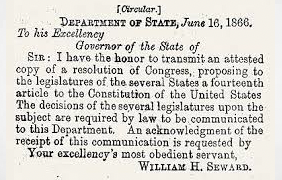I suppose they have minted so much money they might as well try any silliness to stay open..
I’m not sure those who wrote the constitution would have been particularly perturbed by the closing down of these stores and don’t try the Washington grew hemp line on me .. i’m sure he wouldn’t be a big supporter of this type of product….
Here’s one of the many plaintiffs in the image below – I’ll keep it simple.
What has the business and the products the flog got to do with the meaning and aim of the 14th amendment? ..
Answers on a postcard to…. etc etc
Just so we know the exact wording of the 14th amendment 1868 and why it exists
AMENDMENT XIV
Section 1.
All persons born or naturalized in the United States, and subject to the jurisdiction thereof, are citizens of the United States and of the State wherein they reside. No State shall make or enforce any law which shall abridge the privileges or immunities of citizens of the United States; nor shall any State deprive any person of life, liberty, or property, without due process of law; nor deny to any person within its jurisdiction the equal protection of the laws.
Section 2.
Representatives shall be apportioned among the several States according to their respective numbers, counting the whole number of persons in each State, excluding Indians not taxed. But when the right to vote at any election for the choice of electors for President and Vice-President of the United States, Representatives in Congress, the Executive and Judicial officers of a State, or the members of the Legislature thereof, is denied to any of the male inhabitants of such State, being twenty-one years of age, and citizens of the United States, or in any way abridged, except for participation in rebellion, or other crime, the basis of representation therein shall be reduced in the proportion which the number of such male citizens shall bear to the whole number of male citizens twenty-one years of age in such State.
Section 3.
No person shall be a Senator or Representative in Congress, or elector of President and Vice-President, or hold any office, civil or military, under the United States, or under any State, who, having previously taken an oath, as a member of Congress, or as an officer of the United States, or as a member of any State legislature, or as an executive or judicial officer of any State, to support the Constitution of the United States, shall have engaged in insurrection or rebellion against the same, or given aid or comfort to the enemies thereof. But Congress may by a vote of two-thirds of each House, remove such disability.
Section 4.
The validity of the public debt of the United States, authorized by law, including debts incurred for payment of pensions and bounties for services in suppressing insurrection or rebellion, shall not be questioned. But neither the United States nor any State shall assume or pay any debt or obligation incurred in aid of insurrection or rebellion against the United States, or any claim for the loss or emancipation of any slave; but all such debts, obligations and claims shall be held illegal and void.
Section 5.
The Congress shall have power to enforce, by appropriate legislation, the provisions of this article.
Passed by Congress June 13, 1866, and ratified July 9, 1868, the 14th Amendment extended liberties and rights granted by the Bill of Rights to formerly enslaved people.
Following the Civil War, Congress submitted to the states three amendments as part of its Reconstruction program to guarantee equal civil and legal rights to Black citizens. A major provision of the 14th Amendment was to grant citizenship to “All persons born or naturalized in the United States,” thereby granting citizenship to formerly enslaved people.
Another equally important provision was the statement that “nor shall any state deprive any person of life, liberty, or property, without due process of law; nor deny to any person within its jurisdiction the equal protection of the laws.” The right to due process of law and equal protection of the law now applied to both the federal and state governments.
On June 16, 1866, the House Joint Resolution proposing the 14th Amendment to the Constitution was submitted to the states. On July 28, 1868, the 14th amendment was declared, in a certificate of the Secretary of State, ratified by the necessary 28 of the 37 States, and became part of the supreme law of the land.
Congressman John A. Bingham of Ohio, the primary author of the first section of the 14th Amendment, intended that the amendment also nationalize the Bill of Rights by making it binding upon the states. When introducing the amendment, Senator Jacob Howard of Michigan specifically stated that the privileges and immunities clause would extend to the states “the personal rights guaranteed and secured by the first eight amendments.”
Historians disagree on how widely Bingham’s and Howard’s views were shared at the time in the Congress, or across the country in general. No one in Congress explicitly contradicted their view of the amendment, but only a few members said anything at all about its meaning on this issue. For many years, the Supreme Court ruled that the amendment did not extend the Bill of Rights to the states.
Not only did the 14th Amendment fail to extend the Bill of Rights to the states; it also failed to protect the rights of Black citizens. A legacy of Reconstruction was the determined struggle of Black and White citizens to make the promise of the 14th Amendment a reality. Citizens petitioned and initiated court cases, Congress enacted legislation, and the executive branch attempted to enforce measures that would guard all citizens’ rights. While these citizens did not succeed in empowering the 14th Amendment during Reconstruction, they effectively articulated arguments and offered dissenting opinions that would be the basis for change in the 20th century.
THE CLASS ACTION
This action concerns the policy and practice of the New York City Department of Finance, through application by the New York City Sheriff (hereinafter “the Sheriff”) and New York City Office of Administrative Trials and Hearings (hereinafter “OATH”), in executing and enforcing the SMOKEOUT Act, by sealing businesses, with no judicial review and without a court order, and based solely on the unadjudicated claim that a business was selling cannabis without a license.
The execution and enforcement of the SMOKEOUT Act, by the Sheriff, with the limited administrative review by OATH, has resulted in the unconstitutional closure of hundreds businesses, including the Plaintiffs, throughout New York City.
2. The execution and enforcement by the Sheriff and OATH, in sealing businesses without any judicial oversight, is unconstitutional.
3. First, the Sheriff’s execution and enforcement of the SMOKEOUT Act, with OATH’s limited administrative review, violates the Due Process Clause of the Fourteenth Amendment. No judicial process is afforded before the Sheriff sealed businesses. No prior finding or adjudication, by any judge or court, takes place before the Sheriff closes a business. The Sheriff chooses to close a business based upon its own unilateral decision that a business was selling cannabis without a license and posed an imminent threat to the public’s health, safety, or welfare. While the closed-2Case 1:24-cv-04519-JPO Document 11 Filed 06/13/24 of 71 business is given an administrative hearing before OATH within five business days of being closed by the Sheriff, the numerous hearing officers with OATH have issued inconsistent Decisions, and the Sheriff, regardless of OATH’s recommended Decision, still retains the sole decision-making authority as to whether the business will remain closed. The Due Process Clause does not permit the Sheriff to seal a business, without first seeking judicial review, based upon the Sheriff’s own unilateral finding that the business poses an imminent threat to the public’s health, safety, or welfare.
4. The Due Process Clause further does not permit a business’s continued closure for one full year, after a limited administrative review before OATH, where the Sheriff ultimately makes a unilateral decision, needing only to consider but not follow OATH’s Hearing Officer’s recommendation, and there is still no judicial mechanism to examine the findings and decisions made by OATH or the Sheriff.
5. The Sheriff has unlawfully sealed over two hundred businesses in the past five-to-six weeks, all in reliance upon the SMOKEOUT Act and sections 7-551 and 7-552 of the New York City Administrative Code. These widespread constitutional violations must stop, and Plaintiffs and the class members must be compensated for the significant monetary harm Defendants’ unconstitutional actions and practices have caused Plaintiffs and the class members to incur.
1718381173039





















